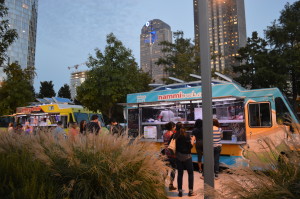
Within a portion of the disassociated working class that never recovered in the jobless recovery after the Great Recession, there exists a burgeoning new society: the Sharing Economy. The why behind the societal shift might best be described as follows.
1. The technology of the internet and its new brand of e-commerce has made it fundamentally comfortable and safe for individuals to do business with perfect strangers, and the peer advocacy system created by organizations like Uber and eBay seems more authentic to the new consumer than the traditional ways of doing business;
2. Prolonged introspection resulting from the Great Recession reminded us that we have possession in excess of our needs; and
3. The Great Recession brought to light the fact that our total net worth is not headed in the direction that we had all come to expect during the economic growth of the 1990s.
It is, therefore, with the tremendous resources brought to the individual by the technology of the Internet, in conjunction with our new emphasis on pragmatism, that each of us is able to turn ourselves into a “corporation” in this new sharing economy. Think of it as a broadening of the service economy on a small-scale, with a dose of the experience economy thrown on top. When you are not using your car, your car is making you money. After you get off work from one part-time job that neither pays you enough nor gives you the benefits and insurance you want and need, you give a few people a ride, allowing you a notion of disposable income.
Before dismissing the importance of this societal shift, process this. Joel Stein pointed out in his latest published assessment that Uber’s market cap is $41 billion—larger than FedEx and Delta—and Airbnb’s is $13 billion, half that of Hilton’s. Now don’t get me wrong, I would personally be surprised if I turn into Uber-Ablon or list my house for $50 a night anytime soon, but a large portion of society have found this to be mutually acceptable and beneficial; an efficient manner in which to extract excess money out of existing personal resources.
Allow me to assert one more theory: This trend is really not about Baby Boomers or Millennials, it is about Generation Connected (Gen C). Although one subset of the new Gen C might be more of a vanguard at the moment (the Millennials), the trend toward sharing is being driven by a constantly changing world. Despite the relentless public beating the Millennials take about work ethic, presumptuousness, or sense of entitlement, they have proven one thing: they can operate extremely well in a world of uncertainty, of constant change, and in an environment without clear order. To this end, the Baby Boomers should take note.
The sharing economy presages yet another iteration in the way in which real estate is supported and implemented. Between the evolution of communication and commerce thanks to the Internet, and the simultaneous overlay of a generational hand-off from the consumer economy to the experience economy, cities and buildings inevitably echo the societal impact on a larger scale.

As most world economies attempt to figure out how to hit home runs, the resourceful in America are learning how to win ballgames playing small ball on a global scale, and when the sharing economy scales, which it will, much of it will scale out of the individual back into corporate America. To simplify the discussion, think about the allocation of a parking spot for a cool Airstream trailer next to Klyde Warren Park dishing out ribs at lunch. Then consider the inception of the home-grown, micro-enterprises that allow for the systematic programming of more of these Airstreams on a daily basis (think Truck Yard). Suddenly, the idea is institutionalized.
I think it’s only a matter of time before the sharing economy ripples through the next iterations of office sharing, retail sharing and residential sharing and, before you veteran real estate professionals rush to remind me that ‘sharing’ is not allowed in a lease structure, it’s really enough to know, at this point, that it’s common practice in many other industries. Think about it this way. Office tenants have sub-leased for decades—yes, for longer-terms and with approval from the landlord. But as the trend toward informality and pragmatism continues to infiltrate every aspect of society, it will inevitably affect commercial real estate, whether formally, or informally.
Despite my demographic tendency to figure out all the logistics, I welcome this change. I welcome the resourcefulness, the “figure it out and get back to work” entrepreneurial spirit of the individual who is driving this notion that the next iteration of buildings and spaces will evolve out of the initial successes and failures. I look forward to arriving at a retail center, and seeing next to the Internet café, the hookah bar, and next to that, whatever turns into the next “Sharing Store.” Maybe it will be located across the street from the antique mall where they are already, well, sharing. Maybe it will be in an office building next to a co-working space where they are already, oh, sharing.
Michael Ablon is principal of PegasusAblon, a commercial real estate development, investment and management company. Contact him at [email protected].





